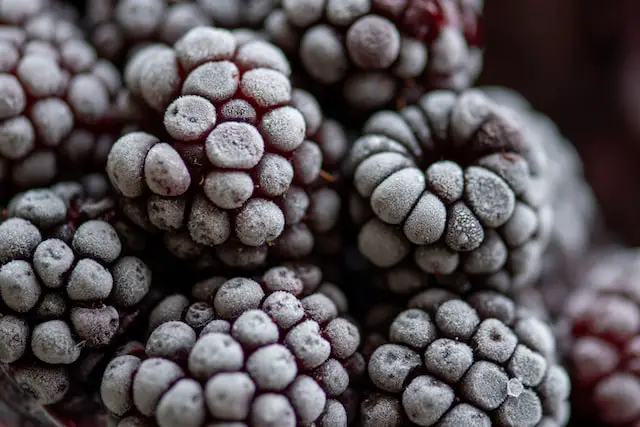
We may receive commissions from purchases made through links in this post, at no additional cost to you.
If you’ve planted blackberry bushes at home, hopefully you’re right around the corner from having more blackberries than you know what to do with. It’s a bit of a mixed blessing – it’s so satisfying to have an abundance of homegrown fruit. But that abundance seems to come all at once, and you’re left with pint after pint of delicious – but perishable – blackberries.
So what’s the best way to store blackberries long term? Freezing. If done right, freezing blackberries will keep that fresh-picked flavor so that you can use your own berries well beyond the summer you picked them. Luckily, there are several easy ways to freeze blackberries to keep the best flavor and texture possible.
To freeze blackberries quickly and keep the maximum fresh flavor, freeze them in a single layer on a tray and then transfer to a freezer bag for later use. Blackberries can also be frozen as a sweetened or unsweetened puree or packed with sugar in an airtight container.
In this article, I’ll show you exactly how I freeze an overload of blackberries using all three methods. Whether the berries come from my own blackberry patch or the grocery store, the freezer is the best place to store them long-term. No matter how you plan to use the berries, freezing is the perfect way to keep the summer harvest going through the winter and into the next year.
Blackberries Should Be Clean and Dry Before Freezing
Washing
The first step is to wash the berries thoroughly. In general, it’s better to avoid washing fresh berries until right before you eat them. But with frozen blackberries, it’s best to clean them before heading to the freezer.
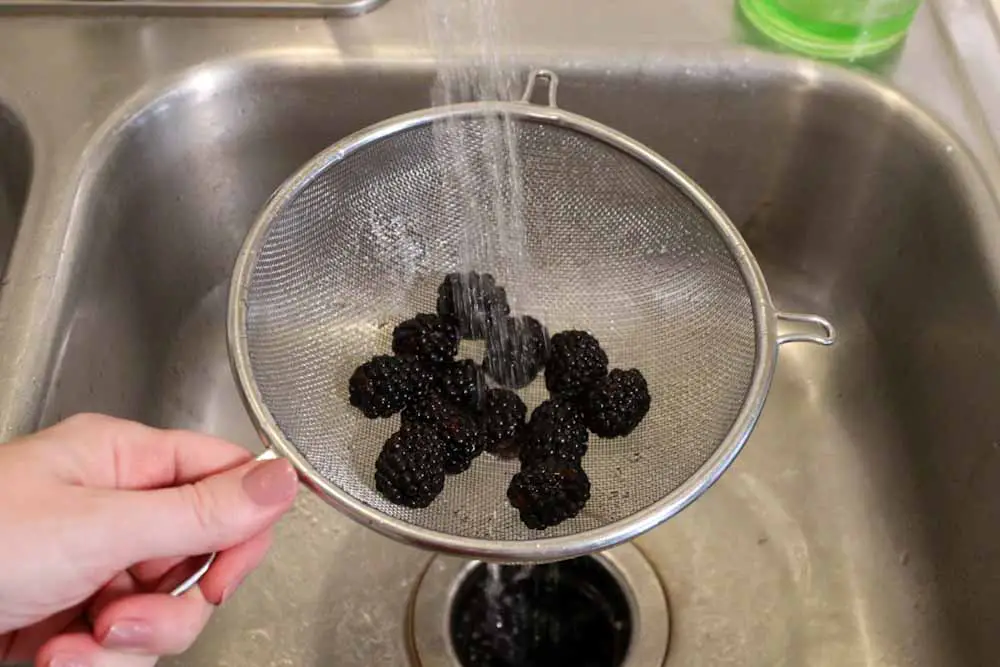
One of my favorite things to do is buy berries in bulk at the grocery store when they are on sale. As in, really on sale – recently I picked up several 8-ounce containers of raspberries for 50 cents each. You can bet I came home with a lot of berries to freeze!
Commercially grown berries tend to be grown in more controlled conditions, often in protected polytunnels or greenhouses. To wash store-bought blackberries, I typically gently rinse them under the faucet in a colander.
You can also fill a bowl with water and gently swish the berries around to remove any dirt. A vinegar and water solution will clean even more thoroughly – I use about a tablespoon of white or apple cider vinegar per cup of water. The vinegar will help remove dirt and other particles, and may even help the berries last longer. Just be sure to rinse the berries in clean water to remove any residual vinegar odor or flavor.
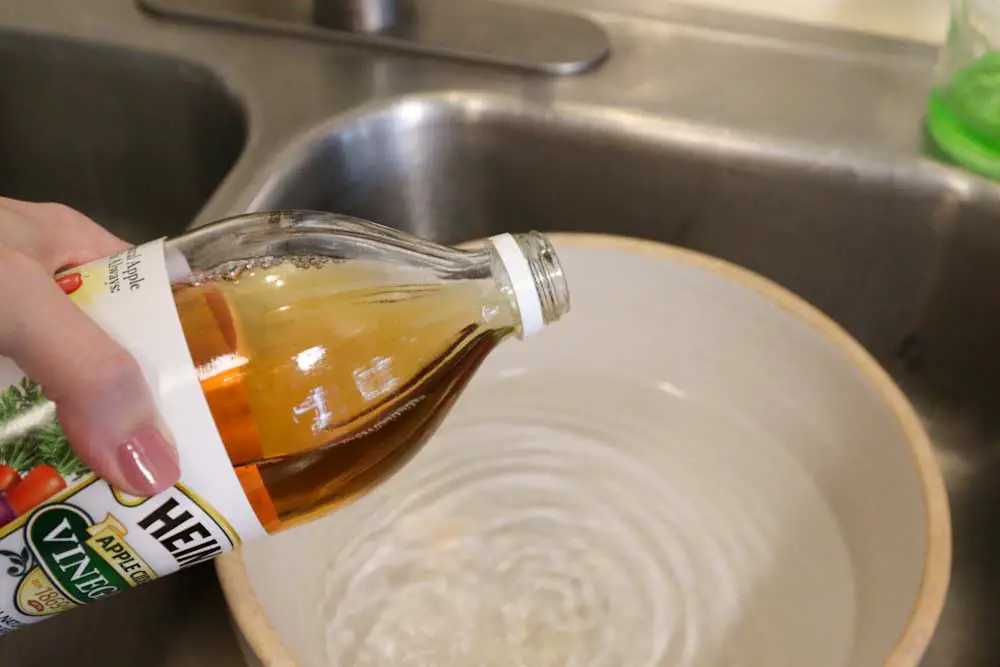
When I bring in fresh-picked blackberries, either from my garden or from a pick-your-own farm, I like to be a little more thorough in my cleaning. Soak the blackberries by covering them with water in a bowl, then sprinkle with a teaspoon or so of salt and swish gently. Let the berries soak in the saltwater for a little while – up to about an hour.
You may notice not only dirt and debris in the water, but the salt will also draw out any fruit fly larvae or other critters that could be lurking among the berries. After soaking, rinse the berries gently in clean water to get rid of any saltiness.
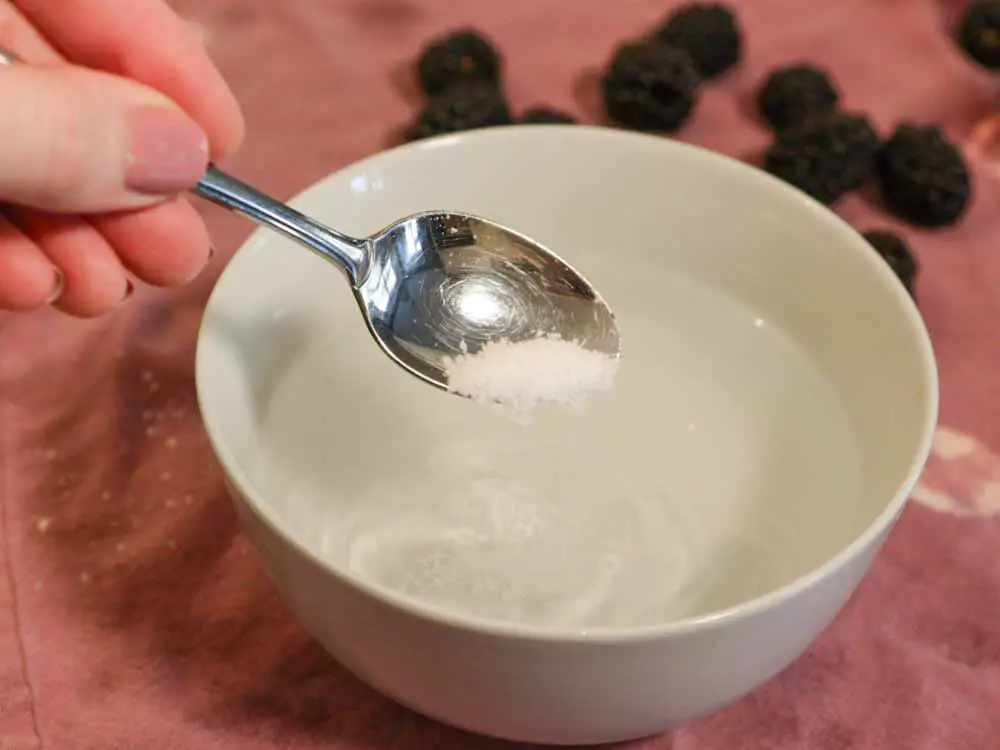
Whichever way you wash the berries, the key is to be gentle– blackberries can bruise easily and become mushy or damaged.
Drying
Dry blackberries by spreading them out on a clean towel in a single layer. Gently tap them with a paper towel or tea towel to get off excess water quickly – being very careful not to squish the berries. Then leave the fruit to air dry completely for about an hour.
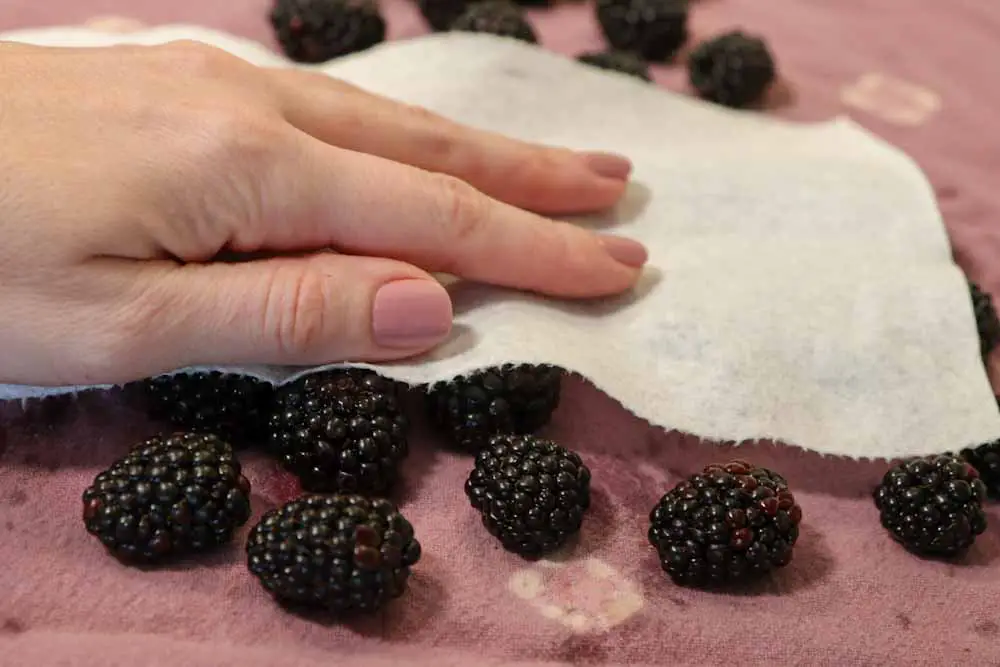
This is important – don’t try to freeze the berries until they are entirely dry. Any water droplets still on the berries will form larger ice crystals in the freezer. Not only will this likely cause freezer burn more quickly, but once the berries are defrosted, the larger ice crystals will damage the berries and cause them to be very mushy.
As soon as the berries are dry, they’re ready to be frozen.
3 Ways to Freeze Blackberries
1. Flash-Freezing Whole Blackberries
To preserve the most fresh-picked flavor and texture, blackberries need to be frozen as quickly as possible. The best way to do this is by spreading them out flat – this also has the advantage that the berries will freeze individually, so when you bag them up they aren’t frozen in a giant clump.
Take the clean, dry berries and lay them in a single layer on a baking sheet or other flat tray. I like to line the tray with a Silpat or parchment paper so that the frozen berries don’t stick. Place the tray in the freezer for at least 2 hours or until the blackberries are mostly frozen.
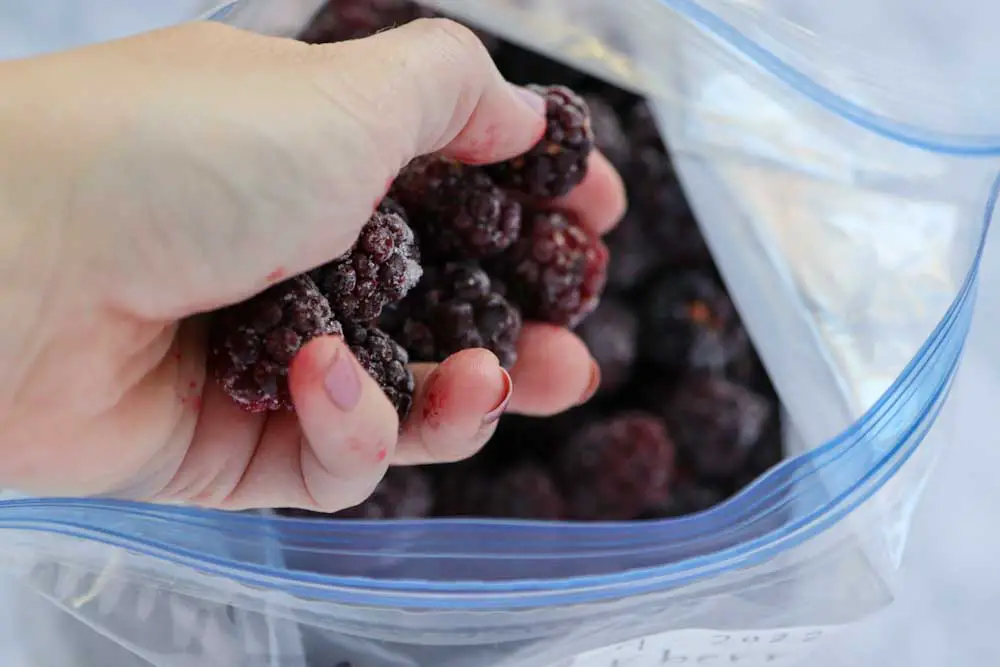
Place the frozen blackberries in a labeled (and dated) freezer bag and store them in the freezer until you are ready to use them. Since the berries are individually frozen, you can grab exactly what you need from the bag and keep the rest safely frozen.
2. Freezing Blackberry Puree
Blending blackberries into a smooth puree is a great way to freeze fresh berries for later use in recipes and drinks. You can make the puree with or without added sugar, and you can strain out the seeds if you want it smooth.
I freeze both sweetened and unsweetened blackberry puree first in ice cube trays, and them transfer them to freezer bags. It’s simple to just grab a cube or two for whatever you need.
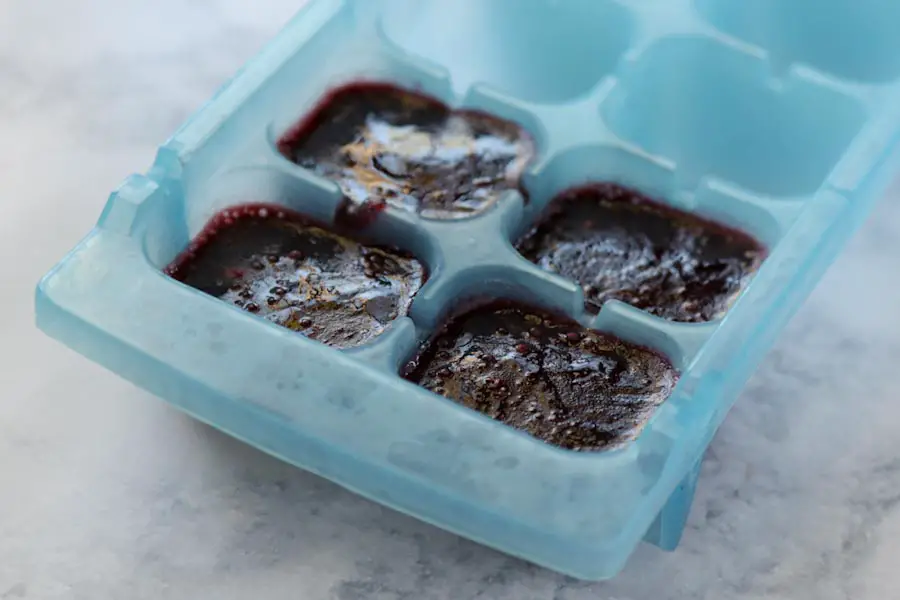
Simple Fresh Blackberry Puree
Using a food processor, puree the fresh, clean blackberries until smooth. Remove the seeds (if desired) by straining the puree through a fine-meshed sieve. Discard the seeds and pulp that is left after straining.
Sweetened Blackberry Puree – Two Ways
- Puree the fresh blackberries as described above. Add simple syrup (one part sugar and one part water, simmered until the sugar is dissolved) to the pureed blackberries until it reaches the desired sweetness.
- Or, place the fresh berries in a saucepan with sugar. The amount of sugar depends on how sweet the berries are. I generally use as little sugar as possible – about 2 tablespoons of sugar per 8 ounces of blackberries is a good place to start. Cook the berries and sugar over medium heat, stirring frequently, until the sugar is dissolved. Then puree the mixture with an immersion blender, or by transferring to a regular blender. Use a sieve to strain out the seeds, if desired.
3. Freezing Blackberries Packed in Sugar
This is a great option for freezing a small amount of blackberries. Simply place the clean, dry berries in a small freezer-safe container or bag, then cover the fruit with regular granulated sugar. I find that, depending on the container, it takes about 1/2 cup of sugar to cover 6 oz. of blackberries (the small sized containers you buy at the grocery store).
You can store these in the freezer for up to 6 months (maybe more, but mine never last that long). The sugar blocks the berries from exposure to air, helps absorb any extra moisture, and does a good job of keeping the blackberries fresh-tasting. I especially like to use this method when the blackberries are more on the tart side.
Related: Why are my Blackberries Sour? Tips to Grow Sweeter Berries
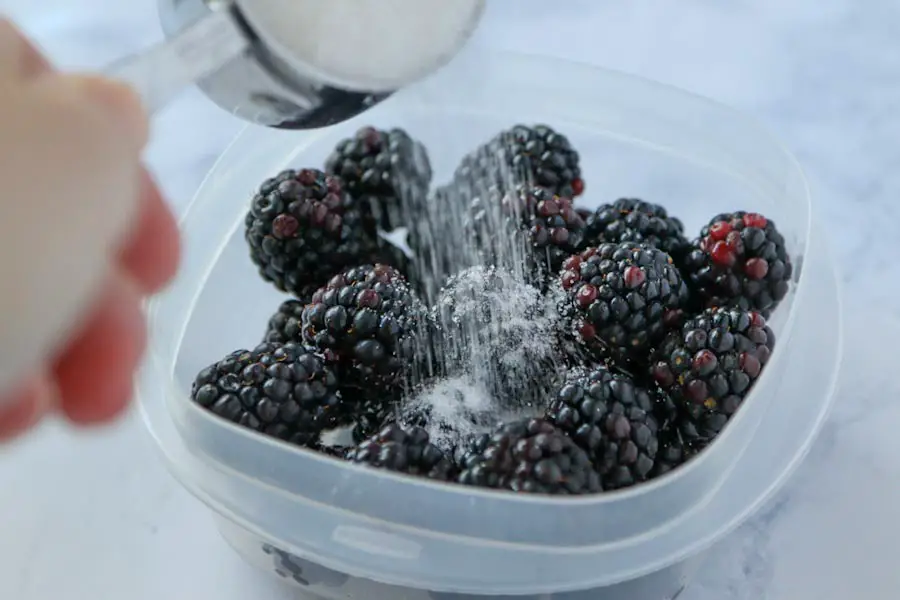
To defrost the berries, separate them from the sugar and defrost using any of the methods I describe below. You can defrost them in the sugar, but it will absorb any liquid or juice that is released from the berries. Either way, I like to then use the sugar in whatever blackberry recipe I’m making.
A Few Things to Know About Frozen Blackberries
How long will frozen blackberries last?
Frozen blackberries will have the best flavor within 6 months of freezing, although they can last for a year or more. Frozen blackberries will eventually develop freezer burn, and the flavor may diminish over time, it’s best to use them within a year.
Blackberry puree made from uncooked berries will last about six months to a year in a freezer-safe bag. If the berries were cooked before blending, the puree may last even longer than a year.
Blackberries packed in sugar will last for at least 6 months in the freezer. Be sure to remove as much air as possible from the container or bag for maximum storage life.
Do blackberries get mushy after freezing?
Blackberries will lose some firmness once they are frozen and defrosted. The ice crystals that form in the freezer will damage the cell walls of the berries and break down the berries’ texture. The method of defrosting blackberries will also determine how mushy the berries become.
Can you refreeze blackberries?
It’s not recommended to refreeze blackberries that were previously frozen. The berries are likely to become extremely mushy and lose texture and flavor if frozen multiple times.
Why did my blackberries turn red in the freezer?
Extreme changes in temperature can cause previously dark blackberries to develop red spots or an all-over reddish hue. This is called reversion, and it can be somewhat prevented by minimizing the temperature change.
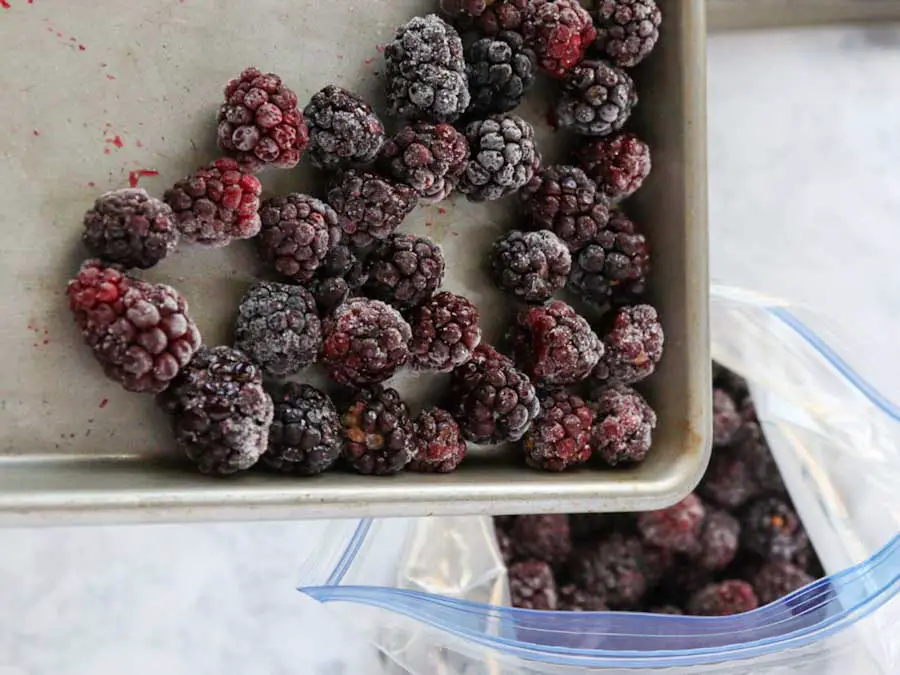
Try to pick blackberries in the cooler morning, before the air temperatures have risen over 73°F. Bring fresh-picked blackberries to room temperature before freezing or refrigerating. It may also help to refrigerate blackberries for a few hours before freezing them.
The good news is, the reddening color does not affect the blackberries’ flavor. Read more about reversion, as well as some other reasons that causes redness on blackberries, in my article Blackberries Turning Red? Here’s What’s Happening.
The Best Ways to Defrost Frozen Blackberries
Any time you defrost blackberries, the texture will be much softer than when they were fresh. The berries will also release liquid as the ice crystals melt. But different methods of defrosting will give somewhat different results.
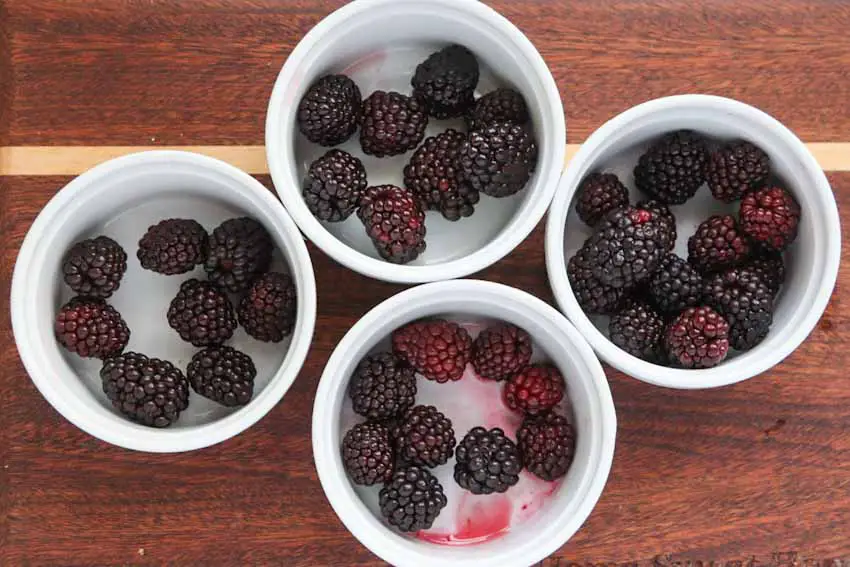
One of the best ways to defrost blackberries is overnight in a refrigerator. The slower defrosting keeps the best texture and releases the least liquid.
You can also leave frozen blackberries out at room temperature to defrost. It typically takes about an hour or so to defrost blackberries at room temperature. The texture ends up being slightly softer than the fridge-defrosted version, but it still stays somewhat firm.
The defrost setting on a microwave is the quickest way to defrost blackberries, but they will end up with the most liquid, soft texture. I use the microwave if I plan to cook them in a recipe and I am in a hurry.
Another relatively quick way to defrost frozen blackberries is by placing the bagged, frozen fruit in a bowl of cool water for about a half hour to an hour. The water will defrost the berries more gently than room temperature air, resulting in a slightly less mushy texture.
Learn more: How to Thaw Blackberries/Raspberries for the Best Texture
Using Frozen Blackberries
The best part about freezing your blackberry haul is that you can use them just about any way you would use fresh berries. My favorite way is to just throw them, frozen, right into any recipe – oatmeal, muffins, pancakes, cakes, breads. The frozen blackberries will add more liquid to baked goods than fresh berries, but I have found this to make little difference in the final results.
If you are concerned about adding too much liquid to a recipe, defrost the berries and then drain them through a sieve into a bowl. Then use the drained berries as needed.
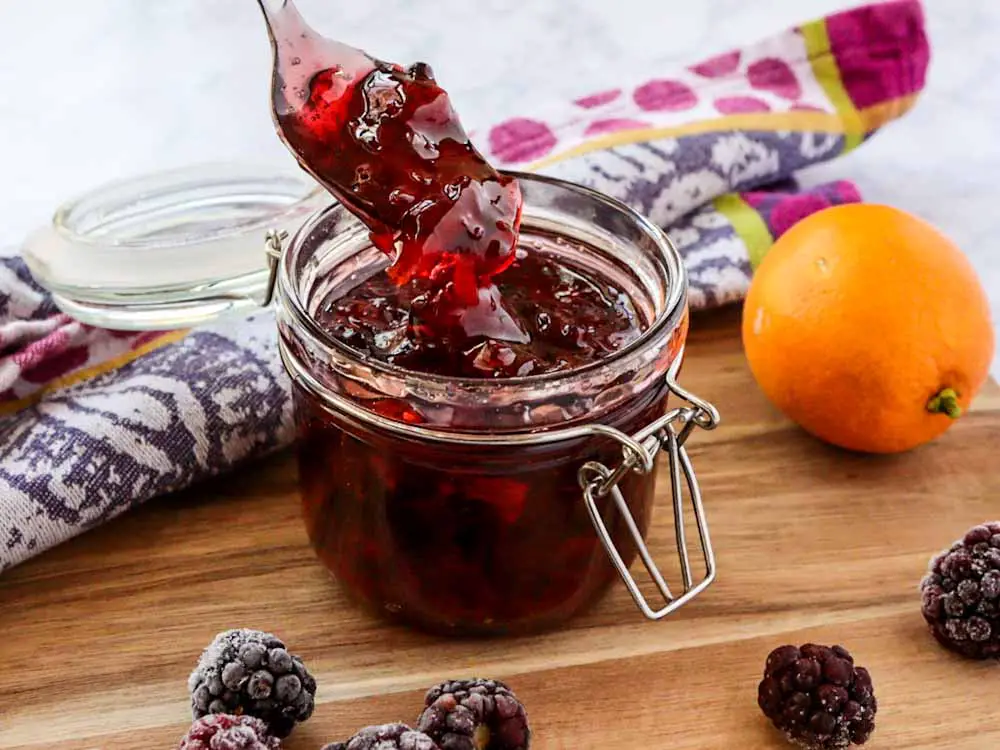
Cooked applications, such as jam, preserves, or sauces are a perfect opportunity to use your frozen berries or unsweetened puree. Try using a couple of puree cubes to make my Blackberry Blood Orange Marmalade. Or swirl some defrosted puree or whole berries into this Blackberry Honey No-Churn Ice Cream.

